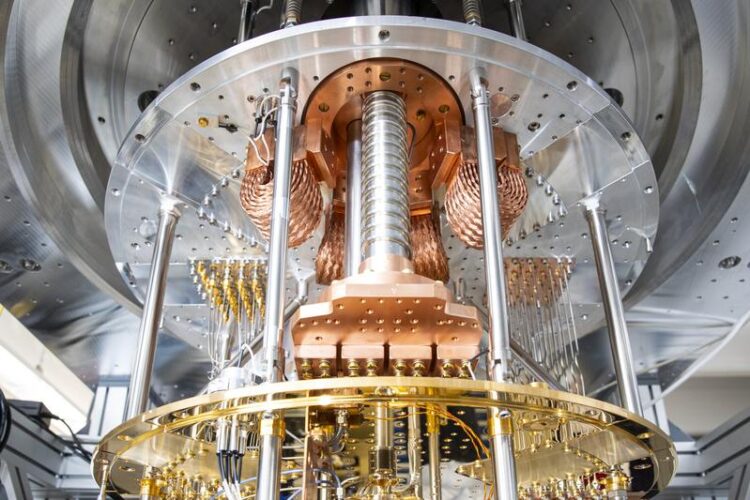The European Quantum Computer Project OpenSuperQ is extended

Cryostat of the OpenSuperQ quantum computer at Forschungszentrum Jülich
Credit: Forschungszentrum Jülich / Sascha Kreklau
OpenSuperQPlus unites 28 European research partners from 10 countries aiming to develop a 1,000 qubit quantum computer.
The project OpenSuperQPlus – part of the European Quantum Technology Flagship – gets underway. It is continuing and enhancing the project OpenSuperQ and brings together most of its team with new partners – including the key partners of the national initiatives of the Netherlands, France, Finland, Germany, Hungary and Sweden, full-stack quantum computing startups and many other key players in the field. The large-scale follow-up project coordinated by Forschungszentrum Jülich involves a total of 28 partners from 10 countries.
This team has formed a framework partnership and put forward an ambitious seven year agenda ultimately leading to a 1,000 qubit quantum computing system. The consortium is now launching its first stage OpenSuperQPlus 100 that on the one hand aims at developing several systems for evaluating hard- and software as well as a user-oriented 100 qubit system for first quantum applications within the next 3.5 years. With regard to the second stage it will also look at the critical components and technological decisions needed for the 1,000 qubit quantum computing system.
OpenSuperQPlus (Open Superconducting Quantum Computers) is funded by the European Union with 20 million euros from a specific quantum grant within the Horizon Europe framework programme. This budget goes a long way through synergies with local and national initiatives.
“We are bringing together European specialists for all the components of such a quantum computing system under a unified framework – be they in the public or private sector. The technological challenge of beating errors in quantum computers and scaling them up needs all hands on deck from the outstanding quantum ecosystem in Europe“, says coordinator Frank Wilhelm-Mauch of Forschungszentrum Jülich.
Like its predecessor project OpenSuperQ, the project’s continuation within the framework of OpenSuperQPlus aims at a versatile quantum computer made in Europe. The consortium anticipates special use cases in quantum simulation for the chemical industry, materials science or in solving optimisation problems and in machine learning.
OpenSuperQPlus Partners
Germany
- Forschungszentrum Jülich GmbH
- Bayerische Akademie der Wissenschaften
o Walther-Meissner-Institute
o Leibniz Supercomputing Centre - Fraunhofer-Gesellschaft zur Förderung der angewandten Forschung e. V.
- Karlsruher Institut für Technologie
- Qruise GmbH
- Rohde & Schwarz GmbH & Co. KG
- supracon AG
- Zurich Instruments Germany
- EURICE – European Research and Project Office GmbH
Finland
- Aalto University
- BlueFors Cryogenics Oy
- CSC – IT Center for Science Ltd.
- IQM Finland Oy
- Teknologian Tutkimuskeskus VTT Oy
Netherlands
- Netherlands Organisation for Applied Scientific Research
- Orange Quantum Systems
- QuantWare B.V.
- Technische Universiteit Delft
France
- Alice & Bob
- Centre National De La Recherche Scientifique
- Commissariat à l’Energie Atomique et aux Energies Alternatives
Hungary
- Budapest University of Technology and Economics
- Wigner Research Centre for Physics
Austria
- Institute of Science and Technology Austria
Sweden
- Chalmers Tekniska Högskola AB
Estonia
- Tartu Ülikool
Spain
- Universidad del País Vasco / Euskal Herriko Unibertsitatea
Israel
- The Hebrew University of Jerusalem
About the Quantum Flagship
The Quantum Flagship was launched in 2018 as one of the largest and most ambitious research initiatives of the European Union. With a budget of €1 billion and a duration of 10 years, the flagship brings together research institutions, academia, industry, enterprises, and policy makers, in a joint and collaborative initiative on an unprecedented scale. The main objective of the Flagship is to consolidate and expand European scientific leadership and excellence in this research area as well as to transfer quantum physics research from the lab to the market by means of commercial applications and disruptive technologies. With over 5,000 researchers from academia and industry involved in this initiative throughout its lifetime, it aims to create the next generation of disruptive technologies that will impact Europe’s society, placing the region as a worldwide knowledge-based industry and technological leader in this field.
Media Contact
All latest news from the category: Information Technology
Here you can find a summary of innovations in the fields of information and data processing and up-to-date developments on IT equipment and hardware.
This area covers topics such as IT services, IT architectures, IT management and telecommunications.
Newest articles
Faster, more energy-efficient way to manufacture an industrially important chemical
Zirconium combined with silicon nitride enhances the conversion of propane — present in natural gas — needed to create in-demand plastic, polypropylene. Polypropylene is a common type of plastic found…

Energy planning in Ghana as a role model for the world
Improving the resilience of energy systems in the Global South. What criteria should we use to better plan for resilient energy systems? How do socio-economic, technical and climate change related…

Artificial blood vessels could improve heart bypass outcomes
Artificial blood vessels could improve heart bypass outcomes. 3D-printed blood vessels, which closely mimic the properties of human veins, could transform the treatment of cardiovascular diseases. Strong, flexible, gel-like tubes…





















